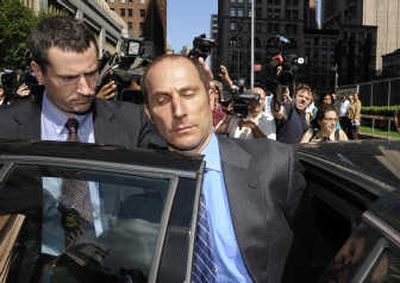Fund execs charged

NEW YORK – Two former Bear Stearns hedge fund managers were hauled into jail Thursday and charged with lying to investors about the collapse of the subprime mortgage market, perhaps signaling the start of a wave of prosecutions arising from the housing meltdown.
Ralph Cioffi and Matthew Tannin were accused of encouraging investors to stay in their hedge funds, heavily exposed to subprime mortgages, even as they knew the credit market was in serious trouble.
They were indicted on conspiracy and fraud counts, the first criminal charges to hit Wall Street in the housing market meltdown.
The eventual implosion of their two hedge funds cost investors $1.8 billion and started the domino effect that led to the demise of Bear Stearns itself, which barely avoided bankruptcy in a rescue buyout by JP Morgan Chase & Co.
“This is not about mismanagement of a hedge fund,” Mark Mershon, head of the New York FBI office, told reporters. “It is about premeditated lies to investors and lenders.”
The arrests came as the Justice Department in Washington announced the indictments of more than 400 players in the real-estate industry since March in a crackdown on mortgage fraud. Sixty were arrested on Wednesday alone.
That alleged fraud includes misstatement of income or assets, forged documents, inflated appraisals and misrepresentation of a buyer’s intent to occupy a property as a primary residence.
The Bear Stearns case against Cioffi and Tannin appears to be based heavily on a series of e-mails that reveal panic and disorder behind the scenes at the hedge fund as its investments began to slide.
“The subprime market looks pretty damn ugly,” Tannin wrote to Cioffi in April 2007. If Bear’s internal reports were accurate, Tannin suggested, “I think we should close the funds now,” and “the entire subprime market is toast.”
The situation became so dire that Cioffi pulled $2 million of his own cash from the fund, but the pair still told investors that they should stay in and that the outlook was good, prosecutors said.
Cioffi, 52, was arrested by FBI agents at his home on the Upper West Side of Manhattan on Thursday morning, and Tannin, 46, was taken into custody outside his New Jersey home.
Both men pleaded not guilty at an afternoon arraignment and were released on bond. Each faces up to 20 years in prison. They left court with their wives and without speaking to reporters.
The mortgage market crisis “took the whole financial world by surprise,” said Cioffi’s attorney, Edward Little. “So our question is, why is Ralph Cioffi being charged in this case?” Tannin’s lawyer, Susan Brune, said he was “being made a scapegoat for a widespread market crisis. He looks forward to his acquittal.”
Legal experts said more Wall Street figures would probably be charged in the credit crisis, the latest front for white-collar prosecutors who brought – and in most cases won – high-profile cases earlier this decade after the fall of Enron.
“There is no doubt the government is always looking to go as high as they can,” said Bill Leone, a former U.S. attorney in Colorado. “Any time you get losses into the billions, the likelihood that higher-level executives participated in decisions increases.”
Subprime mortgages were sold to people with less-than-ideal credit. Many of them began defaulting on their loans when the housing market fell and their introductory “teaser” interest rates shot up, making their payments unaffordable.
Because many of those mortgages were sliced and repackaged as securities that could be bought and sold, the mass defaults caused widespread pain among large U.S. banks.
The collapse of the two Bear Stearns funds is just a small part of the subprime crisis, which is still rippling through the economy.
Hedge funds cater to large investors and the very wealthy and use complex, speculative investing methods in hopes of winning enormous gains. They operate with little government supervision and have lately come under fire from regulators.